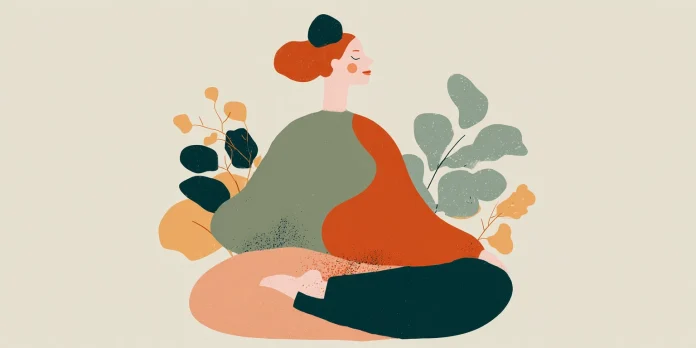Written by Malena Sanchez Moccero
Medically reviewed by Paula Alvarez (Psychologist, Dance-Movement Therapist, Emotional Intelligence Specialist & Applied Neuroscience in the Educational Field Specialist)
For many women, something shifts in their late 30s and early 40s. It’s a period marked by emotional, professional, and even spiritual transitions. Is it a full-blown existential crisis, or could it be an opportunity for reinvention? While it can feel overwhelming, this phase also holds the potential for growth and self-discovery.
And did you get what
you wanted from this life, even so?
I did.
And what did you want?
To call myself beloved, to feel myself
beloved on the earth.
Late Fragment by Raymond Carver
The term “midlife crisis” was introduced by psychoanalyst Elliott Jacques in the 1960s. He observed that people in their late 30s often experienced depression and made abrupt life changes when confronted with their mortality. At that time, life expectancy hovered around 65 years—today, it’s closer to 80. Beyond increased longevity, cultural shifts have also made the generational gap feel narrower.
Traditionally, the concept of a midlife crisis was mostly linked to men—the cliché of buying a red sports car, changing wardrobes, or trading partners for younger versions. But what about women? What happens when they reach this pivotal point in life?
Unlike the stereotypical breakdown, midlife often brings profound emotional, spiritual, and professional changes. It’s not just about aging—it’s about finding purpose and fulfillment.
A New Midlife Crisis: The Female Perspective
A new wave of midlife crises is emerging, particularly among women aged 37 to 45. Unlike the stereotypical breakdown, this phase often brings profound emotional, spiritual, and professional changes. It’s not just about aging—it’s about finding purpose and fulfillment.
Research on midlife health indicates that this period can be highly stressful for women, who often juggle biological changes, work challenges, family responsibilities, financial concerns, and personal aspirations. Managing all these aspects can lead to sleep deprivation, anxiety, and even cardiovascular issues.
The Unique Challenges Women Face
While both women and men experience natural hormonal changes as they age, women undergo a more pronounced shift that can result in sleep disturbances, mood swings, and changes in libido. As menopause approaches, dropping levels of estrogen and progesterone can exacerbate these symptoms.
Many women also feel a strong connection to their families and communities. Often attentive to others’ needs, they may find themselves questioning their identity as their children grow more independent: Who am I now? What do I truly want for the second half of my life?
Women in their 40s and 50s often experience financial stress, job insecurity, and the constant pressure of balancing it all.
Adding to the emotional burden, midlife often coincides with the loss of parents, intensifying feelings of invisibility and disconnection from society. My parents are gone, my kids don’t need me as much—what’s next?
The Exhaustion Factor: Why Midlife Feels Overwhelming
Journalist Ada Calhoun addresses this crisis in her book Why We Can’t Sleep: Women’s New Midlife Crisis. After interviewing over 200 women born between 1965 and 1980, she identified a common thread: “We are overwhelmed, underpaid, and exhausted.”
Women in their 40s and 50s often experience financial stress, job insecurity, and the constant pressure of balancing it all. While Beyoncé’s popular song declares, “Who run the world? Girls!,” the reality of running the world can be exhausting. According to the Pew Research Center, in 1965, mothers spent nine hours a week on paid work and ten on childcare. By 2016, they were juggling 25 hours of paid work and 14 hours of childcare—often at the expense of personal time and self-care.
The Emotional and Psychological Impact
Many women in this stage experience anxiety, restlessness, and self-doubt, which can manifest in different ways:
- Career Dissatisfaction: After years of climbing the corporate ladder, some women start feeling unfulfilled at work. This may trigger a desire for career changes, like exploring entrepreneurship, freelancing, or roles that align more closely with personal values.
- Motherhood and the Empty Nest: Women who became mothers at a young age may find themselves reevaluating their identity as the demands of childcare decrease. The question of purpose beyond parenting becomes more pressing.
- Aging and Societal Pressure: Social expectations place enormous pressure on women to maintain youth and vitality. As they age, women may fear losing social relevance or desirability, leading to feelings of invisibility.
- Spiritual Exploration: Many women turn to mindfulness, spirituality, or holistic wellness practices, seeking deeper meaning and connection with their inner selves. Activities like meditation, therapy, or creative endeavors often become part of this transformative journey.
Experts suggest that those who embrace this transition, rather than resisting it, are more likely to experience personal growth and fulfillment.
6 Symptoms of Midlife Crisis in Women
- Sleep Problems: As Ada Calhoun discusses in her book, one of the most common struggles during this phase is persistent difficulty sleeping. This issue often stems from stress, hormonal changes, and an overactive mind that refuses to quiet down at night.
- Depression and Anxiety: Feelings of sadness, hopelessness, or excessive worry are prevalent. The pressure to meet both personal and societal expectations can result in emotional exhaustion. Many women report feeling trapped between caregiving roles and unfulfilled personal goals.
- Physical Changes Due to Menopause: Declining estrogen levels can trigger hot flashes, night sweats, and weight gain—symptoms that can negatively impact self-esteem and overall comfort.
- Lack of Motivation: It’s common for women to feel drained and unmotivated, questioning the purpose of their daily routines. This lack of drive can be linked to burnout, shifting priorities, or an internal desire for change.
- Self-Doubt: Midlife often brings a period of intense self-reflection, where women question past choices, accomplishments, and the direction of their future. While this introspection can feel unsettling, it also offers an opportunity for growth and reinvention.
A Crisis… or a Portal to Reinvention?
No Woman, No Cry. Well, Bob, that sentiment might feel like just one more expectation to live up to. But maybe it’s okay to cry—and then take action. For many women, this phase can feel like a moment of reckoning. In today’s fast-paced world, taking time to reflect and reassess isn’t necessarily negative. In fact, experts suggest that those who embrace this transition, rather than resisting it, are more likely to experience personal growth and fulfillment.
People who cultivate meaningful relationships, pursue their passions, and remain adaptable tend to experience greater life satisfaction as they age. Happiness can increase when women embrace midlife rather than fearing it.
Key Tips to Navigate This Phase
1. Embrace Change and Curiosity
Midlife is the perfect moment to break free from past limitations. Whether it’s pursuing a forgotten passion, launching a business, or traveling solo—this can be your time to rewrite the rules.
2. Find New Ways to Feel Fulfilled
Many women discover a renewed sense of purpose through volunteering, activism, or mentoring younger women. Studies show that contributing to a greater cause fosters a sense of belonging and fulfillment.
3. Prioritize Mental and Physical Health
Self-care takes on a deeper meaning during midlife. Therapy, exercise, balanced nutrition, and holistic wellness practices help women focus on internal vitality rather than just external appearance.
4. Build a Support Network
Connecting with like-minded women can be transformative. Whether through online forums, in-person support groups, or social networks, creating spaces for shared experiences and solutions can provide invaluable support.
- Remember that you are not alone—many women feel the same way.
- Cut back on social media comparisons.
- Seek therapy or psychological support if needed.
A Cultural Shift: Redefining Midlife
The narrative around midlife is changing. The outdated belief that a woman’s prime ends at 40 is losing ground. More public figures and celebrities are openly sharing their stories of reinvention, helping to reshape how we think about aging and self-worth.
“As you get older and you have more experience, you become a richer human being and you have more to offer,” said Jennifer López in an interview, and added: “People have realized that women just get sexier as they get older. They get more learned and more rich with character. All of that is very beautiful and attractive, and not just physically, but on the inside, the beauty that you gain as you get older, the wisdom you gain.”
Similarly, actress Sarah Jessica Parker has been vocal about the unfair treatment that aging imposes on women compared to men. She encourages women to embrace the passage of time and challenges societal pressures that dictate how they should look as they grow older.
Research supports this shift in perspective. Studies from Harvard on adult development indicate that people who cultivate meaningful relationships, pursue their passions, and remain adaptable tend to experience greater life satisfaction as they age. Happiness can increase when women embrace midlife rather than fearing it.
Midlife Isn’t the End—It’s a New Beginning
The modern midlife crisis is not a breakdown; it’s a breakthrough. While this stage may feel challenging, filled with questions and uncertainties, it also represents a chance for self-discovery, renewal, and empowerment.
Hopefully, women in their late 30s and early 40s will gradually free themselves from outdated expectations. As they go through this midlife passage, they’re redefining success, taking on new adventures and rewriting their own stories.
As more women recognize and work through this transition—seeking help when needed and rejecting societal pressures—midlife can evolve into a revealing, enriching, and rewarding phase.





